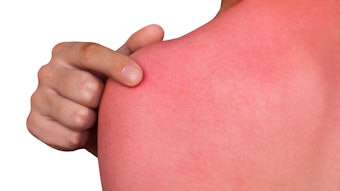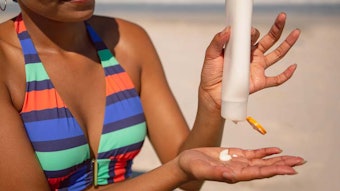
The US Food and Drug Administration (FDA) has proposed a new regulation that sets standards for the formulating, testing and labeling of over-the-counter (OTC) sunscreen drug products with ultraviolet A (UVA) and ultraviolet B (UVB) protection.
"For more than 30 years, consumers have been able to identify the level of UVB protection provided by sunscreens using only sunburn protection factor or SPF values," said Andrew C. von Eschenbach, MD, Commissioner of Food and Drugs, in the FDA press announcement. "Under [this] proposal, consumers will also now know the level of UVA protection in sunscreens, which will help them make informed decisions about protecting themselves and their children against the harmful effects of the sun."
Sunlight is composed of visible light and ultraviolet (UV) light. The two types of UV light of primary concern are UVA and UVB. UVA is responsible for tanning and UVB, for sunburn. Both can damage the skin and increase the risk of skin cancer. According to the FDA the proposed regulation creates a consumer-friendly rating system for UVA products that is designed to help consumers identify the level of UVA protection offered by a product. The ratings system is on a scale of one to four stars. One star would represent low UVA protection, two stars would represent medium protection, three stars would represent high protection, and four stars would represent the highest UVA protection available in an OTC sunscreen product.
If a sunscreen product does not provide at least a low level (one star) of protection, the FDA is proposing to require that the product bear a "no UVA protection" marking on the front label near the SPF value. Ratings would be derived from two tests the FDA proposes to assess the effectiveness of sunscreens in providing protection against UVA light. The first test measures a product's ability to reduce the amount of UVA radiation that passes through it. The second test measures a product's ability to prevent tanning. This test is nearly identical to the SPF test used to determine the effectiveness of UVB sunscreen products.
In addition, a "Warnings" statement in the "Drug Facts" box will be required of all sunscreen product manufacturers. The warning will say: "UV exposure from the sun increases the risk of skin cancer, premature skin aging, and other skin damage. It is important to decrease UV exposure by limiting time in the sun, wearing protective clothing, and using a sunscreen." The warning is intended to increase awareness that sunscreens are only one part of a sun protection program.
"Many consumers incorrectly believe that the only way to protect themselves from skin damage caused by the sun is to apply sunscreens," said Douglas Throckmorton, MD, deputy director of FDA's Center for Drug Evaluation and Research, in a press statement. "The labeling being proposed today strengthens the existing labeling for sunscreens by educating consumers on the added importance of limiting their time in the sun and wearing protective clothing as part of a sun protection regimen."
Once finalized, the proposed regulation would amend the existing OTC sunscreen rule published in 1999 that established regulations related to UVB light and mandated that OTC UVB sunscreen products be labeled with a SPF. The FDA also is reportedly amending its existing 1999 rule to increase the SPF from SPF30+ to SPF50+. Previously, FDA had recognized SPF values up to 30+. Under the proposed amendment, the range would be SPF2 to SPF50+. SPF50 provides more UVB protection than lower SPF values.
Additionally, the proposed rule: revises the existing SPF (UVB) testing procedures; allows new combinations of active ingredients; and asks for comments on the issue of nanoparticles. FDA is accepting comments on the new rule for 90 days until November 26, 2007. Comments must be identified with Docket No. 1978N-0038 and can be submitted electronically or in written form. Electronic submissions can be submitted at the following Web sites: Federal eRulemaking Portal: www.regulations.gov ; FDA Web site: www.fda.gov/dockets/ecomments; Written submissions can be submitted by fax or mail: Division of Dockets Management Food and Drug Administration 5630 Fishers Lane, Room 1061 Rockville, MD 20852; Fax: 1-301-827-6870.










